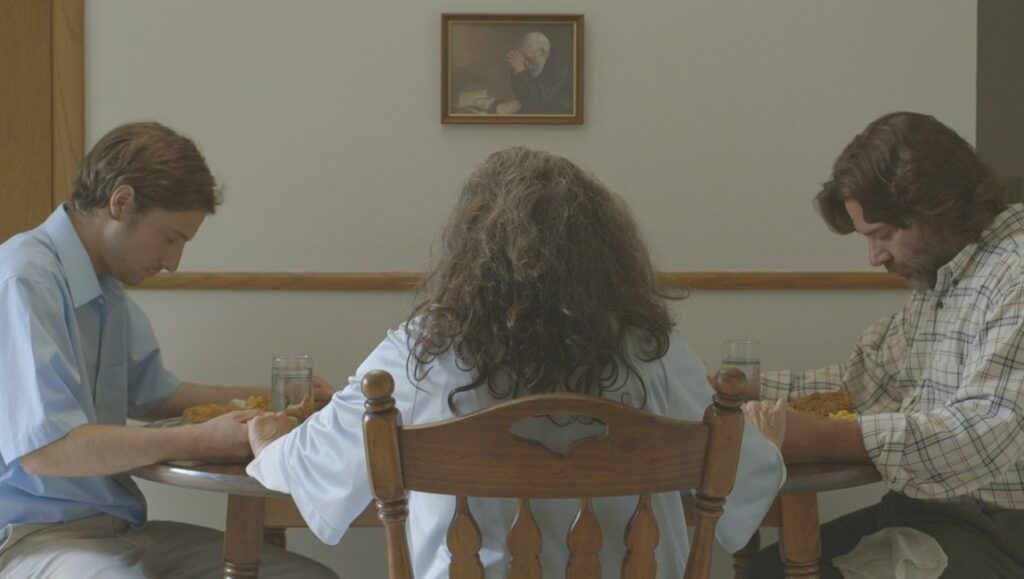As middle-aged philosophy professor Ben Hardin (Robert Longstreet) endures an existential nosedive, Sabbatical responds by redirecting that void on the audience through stylistic deprivation. Director Brandon Colvinshoots in a restrictive 4:3 aspect ratio and never moves his camera. Generally, his shots run parallel to a wall or some other flat surface, and his characters, rarely moving drastically, exist in geometric relationship to that surface. (It’s hard to recall a single ¾ view of a subject in the film; indeed, every shot seems to be organized along 90-degree marks.) Everything’s in sharp focus, but there are usually no more than two things to look at in a given composition, while the rest of the screen is filled with one of the many blank tannish façades that comprise Ben’s mother Rebecca’s house. We’re left with little to contemplate beyond the minute fluctuations of the faces onscreen and the discrete bits of dialogue that every once in a while leave their mouths. Committing wholeheartedly to this tactic for a lean 72 minutes, Colvin has set a challenge for the viewer: to embody the headspace of Ben, who has just inaugurated a sabbatical to care for Rebecca in the event of a recent stroke, and empathize with his plight.
We might be able to reconsider the various components that make up our lives and relocate what makes them worth living.
Ben’s often seen in close-up, which for Colvin is not a way to highlight a person within a larger context (notice, for instance, how over-the-shoulder angles are avoided), but rather to reflect the fundamental spatial restriction of our existence, in which our perspectives are always limited to the confines of our own bodies and coherence must be gathered from bits of stimuli around us — in this case, offscreen. But after introducing a close visual relationship to the perspective of Longstreet’s sullen enigma, Sabbatical allows for digressions. In a notable moment of vulnerability for Ben, Colvin fixates at length on the reaction of Sarah Walsh (Rhoda Griffis), an old girlfriend with whom one gets the sense Ben didn’t expect to reacquaint. Midway through, younger brother Dylan (Kentucker Audley), fresh off a job firing, arrives for nursing assistance in a comparable state of spiritual dejection. While never overshadowing Ben’s position as the focal point of the film’s inquiry into aging and self-reckoning, these swings in emphasis place his ennui into broader context, finding the roots of his sorrow within others. Sabbatical’s imprisoning aesthetic may inflict the same psychological exhaustion inherent within its characters, but its dispersal of narrative focus encourages one to see these trials as being omnipresent, interconnected and thus conquerable if recognized as such. By situating an estranged character back amongst his most long-term friends and relatives, it soberly asks how, in a world of increasing reliance upon fixed, machine-like logic (Colvin features actual machines — lawnmowers, microwaves, an overheard power saw, etc.), we might be able to reconsider the various components of our lives and relocate what makes them worth living.

